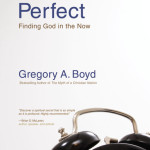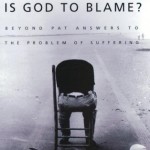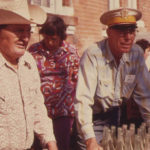We run our website the way we wished the whole internet worked: we provide high quality original content with no ads. We are funded solely by your direct support. Please consider supporting this project.

When God Needs an Intercessor
In the previous two posts, we have been exploring biblical narratives that point to how God’s knowledge is temporally conditioned and thus supports an open view of the future, or open theism as it is commonly called. The first addressed how God regrets and the second how God discovers. In this post, I want to briefly look at another example that demonstrates that God’s knowledge is temporally conditioned: the story of God searching for an intercessor.
The passage I want to explore is found in Ezekiel 22. Here the Lord declares his disappointment and righteous indignation with Israel. In a passage that emphasizes the urgency of prayer perhaps more emphatically than any other text in the Bible, the Lord says of his people:
The people … have oppressed the poor and needy, and have extorted from the alien without redress. And I sought for anyone among them who would repair the wall and stand in the breach before me on behalf of the land, so that I would not destroy it; but I found no one. Therefore I have poured out my indignation upon them (vv. 29-31).
If we take this passage at face value, the fate of Israel depends upon whether or not the Lord finds anyone to “stand in the breach” before him as Moses had done earlier in Exodus 32. Unfortunately, this time there was no one like Moses to intercede and alter God’s declared intent.
There are many examples of intercessors offering prayers to the Lord and God responding to them in such a way that he “changed his mind” in the light of human input and changing circumstances.
Examples include:
- Moses prayed and the fire of God’s punishment died down (Num 11:1)
- After God told Moses that he would raise up a nation around Moses, Moses interceded for the Israelites and God relented (Num 14:11ff)
- Moses and Aaron interceded for the assembly (Num 16:20-48)
- Moses prayed after the golden calf incident (Deut 9:13-26)
- David prayed on behalf of the land that was being destroyed by an angel (2 Sam 24:17-25)
- King Ahab repents and humbles himself and God delays the judgment (1 Kings 21:27-29)
- The leaders of Israel repent and God changes his judgment (2 Chron 12:5-8)
- The Lord relented after Amos prayed (Amos 7:1-6)
The genuineness of the Lord’s search for a person to stand in the breach is compromised if in fact God knew all along that no one would be found. Unless the Lord genuinely hoped he could raise up someone, genuinely tried to find that person and was genuinely frustrated at finding no one, it’s not clear what this passage communicates.
If God’s hope, attempt and frustration were genuine, the question of whether someone would stand in the breach had to be an open issue when God began his search. One can’t hope and try to find something one is certain does not exist. The open view renders the urgency that Scripture attaches to intercessory prayer intelligible precisely because it accepts at face value Scripture’s teaching that things genuinely hang in the balance on whether or not people pray.
—Adapted from Satan and the Problem of Evil, pages 107-108
Photo credit: rachel sian via VisualHunt / CC BY-NC
Category: General
Tags: Divine Foreknowledge, Free Will, Intercession, Prayer
Topics: Open Theism
Verse: Ezekiel 22
Related Reading

How do you respond to Romans 8:29-30?
Question: Romans 8:29–30 says that everyone God foreknew he predestined. You deny both that God foreknows and predestines individual believers. So this verse seems to refute your open view. Answer: First, as many exegetes have noted, the sort of “knowing” Paul intends in this passage is not merely intellectual knowledge, but rather an intimate affection.…

Living As If God Exists
It is so easy to do our daily stuff of life as though God does not exist. This is not a statement about our beliefs about God’s existence. It’s a statement about our moment-by-moment living. This is even true for those of us who spend most of our time in daily work that is directly…

How Can Salvation by Grace Involve Free Will?
How does salvation by grace work if people have free will? If salvation hinges on whether individuals choose to be saved or not, is salvation based on grace or works? If we have to choose for or against God, then doesn’t the credit for our salvation ultimately go to us? Along the same lines, doesn’t…

Quotes to Chew On: Prayer and Finitude
“We pray as we live: in a sea of ambiguity. This is not because we are fallen but because we are finite. And we are inclined to forget we are finite. We ignore the ambiguity that accompanies our finitude, and thus we claim to know what we can’t know. We reduce the unfathomable complexity of…

Does the Open View Undermine God’s Sovereignty?
A common objection to the concept of a risk-taking God is that it seems to undermine God’s sovereignty. If any particular individual can opt out of God’s plan, then every individual could conceivably opt out of God’s plan, and it seems that God’s entire plan for world history could ultimately fail. Some have argued that…

What Did Jesus Mean By Saying We “Will Do Even Greater Things Than These”? (podcast)
John 14:12-14 12 Very truly I tell you, whoever believes in me will do the works I have been doing,and they will do even greater things than these, because I am going to the Father.13 And I will do whatever you ask in my name, so that the Father may be glorified in the Son.…
